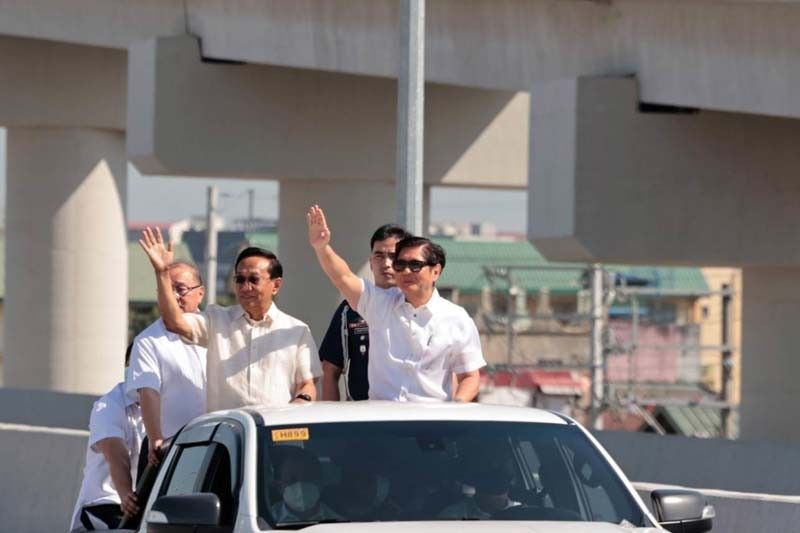Marcos: Rule of law Prevails in Philippines

MANILA, Philippines — In the Philippines, the rule of law prevails and the justice system “is fully functioning,” President Marcos said in an international summit held a day after he maintained that the country will not cooperate with the International Criminal Court (ICC) in its probe on the deaths of thousands in the drug war of the previous Duterte administration.
In a video message for the plenary of the second session of the US-led Summit for Democracy last Wednesday, Marcos said the Philippines’ commitment to “fight impunity for atrocity crimes” remains “solid and unwavering,” notwithstanding its withdrawal from the Rome Statute, the treaty that created the ICC.
The Philippines ratified the Rome Statute in 2011 but former president Rodrigo Duterte withdrew the country from the treaty in response to the ICC’s plan to investigate his war on narcotics, which has left more than 6,000 drug suspects dead.
“Let me emphasize (that) the rule of law prevails in the country—our criminal justice system is fully functioning. We continue to improve mechanisms such as the AO (Administrative Order) 35 inter-agency committee to enhance accountability,” Marcos said.
He was referring to the order that established the inter-agency committee on extralegal killings, enforced disappearances, torture and other grave violations of the right to life, liberty and security of persons. The committee, created in 2012 by then president Benigno Aquino III, was tasked to conduct an inventory of all cases of extralegal killings and to conduct investigations to identify their perpetrators.
The video message was released days after the appeals chamber of the ICC denied the Philippines’ request to suspend the probe on the drug crackdown of the Duterte administration and the activities of the so-called Davao Death Squad. In a decision dated March 27, the chamber said there are no persuasive reasons that would warrant the suspension.
When asked by reporters to react to the chamber’s decision last Tuesday, Marcos said the Philippines would disengage from any communication with the ICC because the government’s appeal has failed. He had also reiterated that the country cannot cooperate with the ICC because of the “very serious questions” about its jurisdiction.
Engagements on human rights
In the same video message, Marcos gave assurance that the Philippines would continue to engage countries bilaterally and in international platforms on issues concerning democracy, human rights and good governance “as long as these engagements are constructive, based on facts, and respectful of Philippine sovereignty.”
“The Philippines will sustain its tradition of open, constructive, and active engagement on human rights on matters that will meaningfully contribute towards reinforcing the sinews of democracy and of freedom,” the President said.
According to Marcos, the Philippines’ joint program on human rights that it launched with the United Nations in 2021 has shown “significant progress” in fostering consensus building and collaborative partnership in a broad range of areas.
The program’s capacity building and technical cooperation framework complement the Philippines’ efforts related to investigative and accountability mechanisms, improving data gathering on alleged police violations, civil society engagement, mechanisms that support its commitment in various human rights agreements and human rights-based approach to drug control and counterterrorism, he added.
Marcos also cited the law punishing heinous crimes as well as the government’s anti-drug campaign that focuses on strengthening programs on rehabilitation, prevention and education; providing assistance to drug victims and their families; and ensuring transparency and accountability on law enforcement operations.
“We have vigorously exercised our jurisdiction to investigate and prosecute crimes, including those allegedly committed in the context of the anti-illegal drugs campaign,” the Chief Executive said.
Justice reform agenda
Marcos also talked about measures designed to reform the judicial system and to promote the rights of migrant workers, women and children.
“Recognizing that economic recovery and progress can only take place in a responsive environment with transparent, effective, and responsible institutions, this government has rolled out measures to achieve our objectives for people-centered growth and for their prosperity, by consolidating reforms in our judicial system,” he said
“We are investing more to enhance the administration of justice through the various institutions and mechanisms already in place to protect the right to life, liberty, and security of Filipino people.”
Marcos said the government has prioritized the creation of the Department of Migrant Workers to protect and promote the rights of more than 10 million Filipinos who live and work in other countries. — Elizabeth Marcelo, Cecille Suerte Felipe
- Latest
- Trending





























